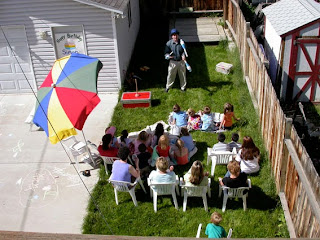May 21, 1997: Here's what it looked like in our neighborhood after the trees finally burst into bloom. I truly believe they were waiting for Simon. And he was waiting for them. And that's why it took so long...
This photo is labeled "first stroll" with Simon. He was five days old.
May 21, 2015: This evening, I am finally posting a narrative of Simon's actual birth. I'm not sure why I've been putting it off (maybe because it's long? maybe because it's such a weighty experience?). Someday I want to start an essay with these words: "My son's birth didn't cause me any pain."
It's true. It took some concentration, some patience, and a whole lot of trust, but it was nothing like pain. Maybe the secret is having a doula. Maybe the secret is having what the midwife calls a "favorable pelvic opening." Maybe it's having a 7-pound baby whose head is not too large. Whatever it was, I'm grateful.
On
May 16th, I wrote about watching a movie with our friend Anne, how my belly became unusually quiet, how Markus listened carefully for a heartbeat, how we went to sleep. Going solely from memory, I will tell about Simon's birth. (Here is my biggest clue that my birth files are incomplete: I'm missing the multi-page handwritten and later typed up account I wrote of Simon's birth. I remember Anne typed some of it for me. I know I wrote it. I need to dig around in the basement someday. For now, I will go from memory alone.)
Around 3:00 am on May 17th, I woke with a dull ache in my low back. I squirmed into a hands and knees position in bed, stretching for some relief. Markus rubbed the uncomfortable spot a little. We both settled back to sleep. By 5:30 am, after a few more half-wakenings, I couldn't lie in bed anymore. My belly squeezed up for a few seconds, then released. Was this a contraction? Real labor? False labor?
We took a dawn walk, looping around the sidewalks of Northwood IV. Now and then I stopped and leaned against Markus to let the tightening pass. He looked at his watch. We tried to remember guidelines about noticing how many seconds long and how much time in between.
Back at home, we had breakfast. I ate toast. Perhaps it was at this point, perhaps even earlier, that I began a series of bowel movements that weren't exactly diarrhea but that seemed intent on clearing me out. I recognized the phenomenon: the same thing happened to me on the day of a big performance (like my voice recitals in college). I have a name for it: worm poop. I can see why the body wants to clear itself in both situations.
Mid-morning we notified Bonnie, our doula. She had a complex schedule because she worked several jobs. That morning, she was at the clothing boutique. As a professional doula, she had maintained back-up plans so that she could drop out of her normal routine as soon as we made the call. We told her not to hurry, but to head over to our place by the end of the morning.
Meanwhile at home, I tried different ways of handling the sensations of labor. Was this still early labor? I could talk through a contraction (that was one of the tests). I called the on-call midwife to let her know things were starting up. I said, "I think I'm in labor..." and choked up. It was Carol Shultheis who took the call, the nurse-midwife who had followed me prenatally. Lucky! She was the midwife du jour. She told us to relax, that it sounded like we were doing good early labor at home, that we should give another call if we noticed a change.
I tried the bathtub. We filled it with warm water, and I hoisted my body in. As soon as I sat down, legs straight out in front of me, I felt terribly confined. My legs and back went into spasms. Nope, not in the tub.
I sat on the sofa and asked Markus to microwave two compresses to set behind my back. This position worked well for a while. The warmth was soothing, and I could read a bit. Markus timed a contraction now and then, but he needed something else to do. He went to the kitchen and cleaned out the refrigerator! I began to feel nervous about breathing right during birth. I had no technique! My birth teacher had said, "Just breathe." My prenatal massage therapist, the amazing Audrey Simon, had taught me to groan for labor: a walrus bellow from low in the pelvis, down by the pubic bone. Screaming in a high voice only makes you tense. But I picked up the Kitzinger birth book and read her section on breathing. For the first time. While in early-mid labor.
At some point I had another strong urge for the toilet, so I hauled myself upstairs. Bonnie arrived, and she came straight to me in the bathroom. "Good position!" she cheered. While I sat, she reached around and rubbed my back during contractions, which were getting louder. When I said I wanted to stand up, she helped me into another favorable position of leaning against the wall. I remember one interchange clearly. A wave of muscle work washed through me. I leaned onto my hands at shoulder height on the wall. Bonnie doula-rubbed my back, praising my progress. When it was over, I rested against the wall and said to Bonne: "The good thing about contractions is they stop."
The endorphin rush was delicious.
There would have been another call to the midwife. There would have been a point when Markus lugged bags to the car: my overnight bag and the duffel bag with
Aqua Tub supplies. By 1:00 pm we were on our way. The seven minute car ride was more like nine because of construction on one of the streets, which had been stripped to a bumpy surface. Markus had to go slow because the bumpiness made me crazy, and my contractions were intense.
We left the car in the drive. As soon as the elevator door opened, I went into a contraction. I waved the elevator away, leaned against the wall, and bellowed till it was over. In the relaxing pause, I had thoughts like this: "Wow, I wonder how bad this will be when it really gets started!" I'm amused and a bit dismayed to remember our entrance in the maternity waiting area. It was a quiet Saturday, and there was no one in sight but a receptionist. I said something like, "I think I'm in labor."
In the triage room, I was nervous. What if this isn't really it? The nurse-midwife would come and check my cervical dilation and effacement. Dilated to only 4 cm (instead of closer to 10 cm) I'd probably get sent home to labor on my own and not in the confines of the hospital. Carol arrived, asked some questions, put on a glove, and gave me a check. "10 centimeters!" she said, "and just about fully effaced. Let's go have a baby!"
Markus, Bonnie, and I felt like people hitting the jackpot on a game show.
I rode in a wheelchair, piloted by Carol, over to the birthing room area. She took back hallways to make the trip faster. In the chair, I began to rattle. My whole body shook. My consciousness flew up to look down on us from above. In the hallway as we neared our birthing room, a couple walked slowly in the opposite direction. She wore a white flared nightgown and had long brown hair. He wore jeans and a sweatshirt. The woman may have been a little startled by the shaking woman in the wheelchair. The man just looked at me and said, "Labor!"
It was, in fact, transition--the part of labor that moves from contractions to open the cervix to contractions that push the baby out. Surprisingly, I found all the rattling deeply relaxing.
In the birthing room, Carol suggested I try a semi-upright position with the head end of the bed raised to a 90-degree angle. She had me turn around and drape my upper body over the raised bed so I could kneel and let gravity help. I thought,
But then I can't watch. (I had pictured using a mirror so I could watch the birth.) But I trusted her impulse and gave it a try. Markus stayed close to my face, talking to me and putting a straw in my mouth so I could sip juice between contractions. Bonnie massaged my back.
At some point Markus remembered the Aqua Tub stuff down in the car. He asked Carol if he should go down for it. She smiled. It was way too late for a tub.
After pushing was definitely underway, Carol asked our permission to break the amniotic sac. That whole "her waters broke" event never happened, and the sac was still in tact. I was reluctant to do anything "unnatural," but we agreed because she was concerned about meconium. Babies who come past their due date have a greater chance of releasing meconium from their bowels into the amniotic fluid. It's highly dangerous to the baby's airways. If there's meconium, you need to do careful suctioning of the nose and mouth immediately after birth.
She poked three tiny holes in the sac, and clear fluid trickled out. She said it looked good.
Push. Rest. Push. Rest.
As Simon progressed down the birth canal, the amniotic fluid came more freely. His head had been a cork, Carol said, and behind that cork there was indeed meconium. She called two pediatricians into the room to stand by for immediate suctioning.
When the baby crowned (i.e., you could see the top of the head), I sent Markus to my backside to watch. Bonnie came to be "with me" in my reverse position. This was the moment, the will I rip to shreds moment, the no-thank-you episiotomy moment.
Whatever happens to me, they will fix me up! I told myself.
Let go.
Out came his head, upside-down and facing Markus, who says Simon immediately blew a raspberry. (I consider that nature's way of dealing with meconium. My body squeezed in on him and something--air? fluid?--released through his mouth and nose.) In that moment, I felt a flash of energy from my perineum to my navel.
I have ripped completely in half, I thought,
and I don't care.
In fact, I didn't tear at all. Later, Carol's assessment was "just a few skid marks."
One shoulder. Now the other. (We had a tense moment when Carol asked me to push the second shoulder out even though my body wasn't contracting. I'd been taught not to do that. Again, I trusted her and followed her instructions.)
Out he slipped. Snip went the scissors on the cord, and the pediatricians whisked Simon to a warming table, reassuring us he was fine, this would only take a minute, we could hold our baby very soon. As Simon was flying through the air--a wet and purple thing--one of the doctors asked, "What's his name?"
"Simon!" Markus and I said together.
 |
| May 17, 1997 ~2:40 pm |
He came to our arms soon enough. He was fine. APGAR was 8 out of 10 (I can't remember why). We'd been at the hospital less than 90 minutes. Good for me. Good for Simon. Good for all of us. We were a great team, and we had a great birth. Look at Markus--birth looks great on him!





















































